
In this blog, Freya Williams, Alice Pugh and Juliane Schwarz examine the referral of businesses by the Greater Birmingham and Solihull Local Enterprise Partnership (GBSLEP) Growth Hub to universities in the West Midlands, including what sectors they come from, the size of businesses and what kind of support they receive.
GBSLEP Growth Hub
The Greater Birmingham and Solihull Local Enterprise Partnership (GBSLEP) Growth Hub offers assistance to businesses located in the GBSLEP area (Birmingham, Bromsgrove, Cannock Chase, East Staffordshire, Lichfield, Redditch, Solihull, Tamworth and Wyre Forest). Support to the business is free, though they may be required to make a matched contribution depending on the funding source where a grant is being provided. The Growth Hub is funded by national organisations such as the Department for Business, Energy and Industrial Strategy and continues to receive funding from the European Union Regional Development Fund until 2023. Support is provided either within the Growth Hub, GBSLEP or external partners such as regional universities.
Businesses Support by University Providers
Upon contacting the Growth Hub, an individual business’ support needs are assessed before being connected to the most appropriate service and provider. Between October 2019 and July 2021, 1428 businesses contacted the Growth Hub, almost three quarters (1046 out of 1428) were referred to either internal or external providers for further support. The Growth Hub itself dealt with the majority of enquiries internally through the Peer Networks, Access to Finance Portal, and Brexit Advisors. Businesses are also referred to other parts of the GBSLEP, such as the Skills Hub, Digital Welcome Scheme, and the Pivot and Prosper Grant Fund or external partners such as local councils, banks and universities.
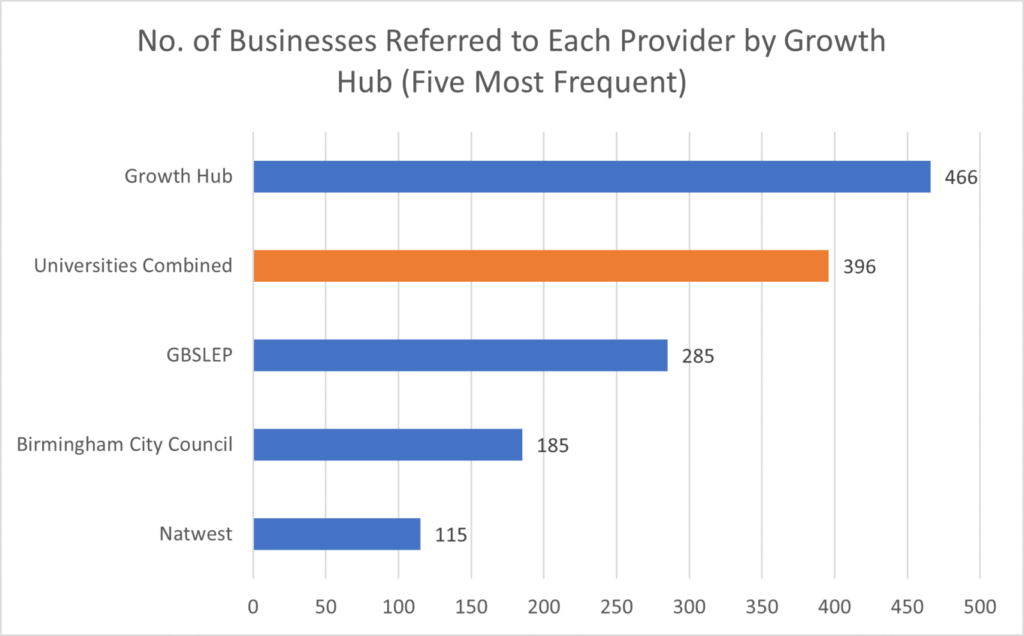
Over a quarter of businesses (27.7%) that contacted the Growth Hub in the time period were referred to one of the nine regional university partners. The university partners are:
- Aston University,
- Birmingham City University,
- Coventry University,
- Keele University,
- Staffordshire University,
- University of Birmingham,
- University College Birmingham,
- University of Warwick,
- University of Wolverhampton.
Businesses that accessed university support through the Growth Hub were mainly referred to specific university business support programmes (81.6%) that provide specialised support such as the adoption of new technologies and processes, skills development, and business leadership.
Location
Most businesses supported by universities via the Growth Hub are located in Birmingham (286 of the 396). Solihull had the second most businesses referred (34), followed by Lichfield (21). Seven businesses referred to universities by the Growth Hub are located outside of the GBSLEP.
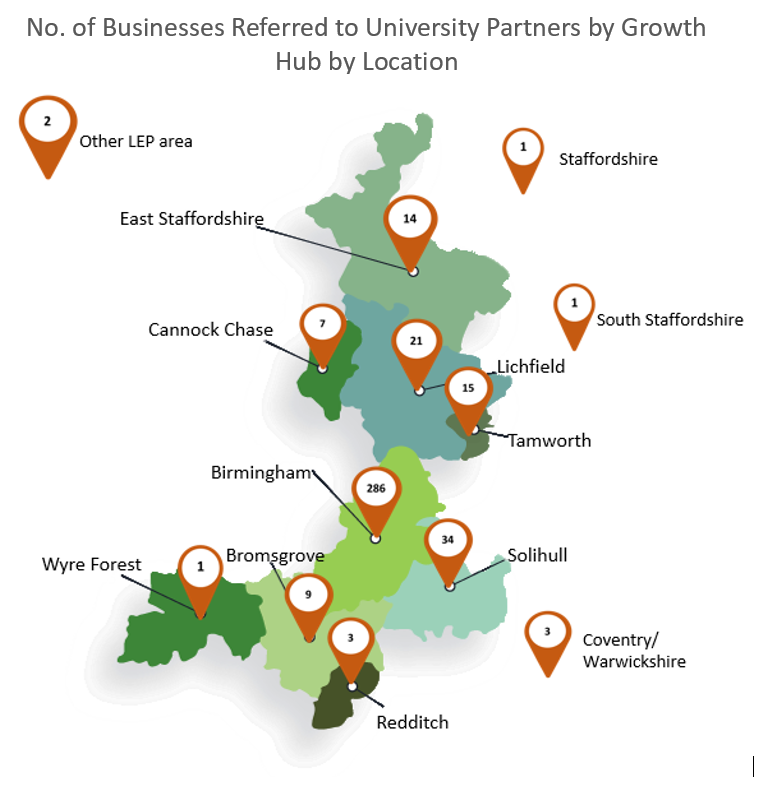
Sectors
Businesses receiving support from universities via Growth Hub referrals operate in 18 different company sectors.
The most common sectors are:
- Manufacturing (83 businesses).
- Other service activities (67 businesses).
- Professional, scientific and technical activities (46 businesses).
- Information and communication (46 businesses).
- Wholesale and retail trade; repair of motor vehicles and motorcycles (37 businesses).
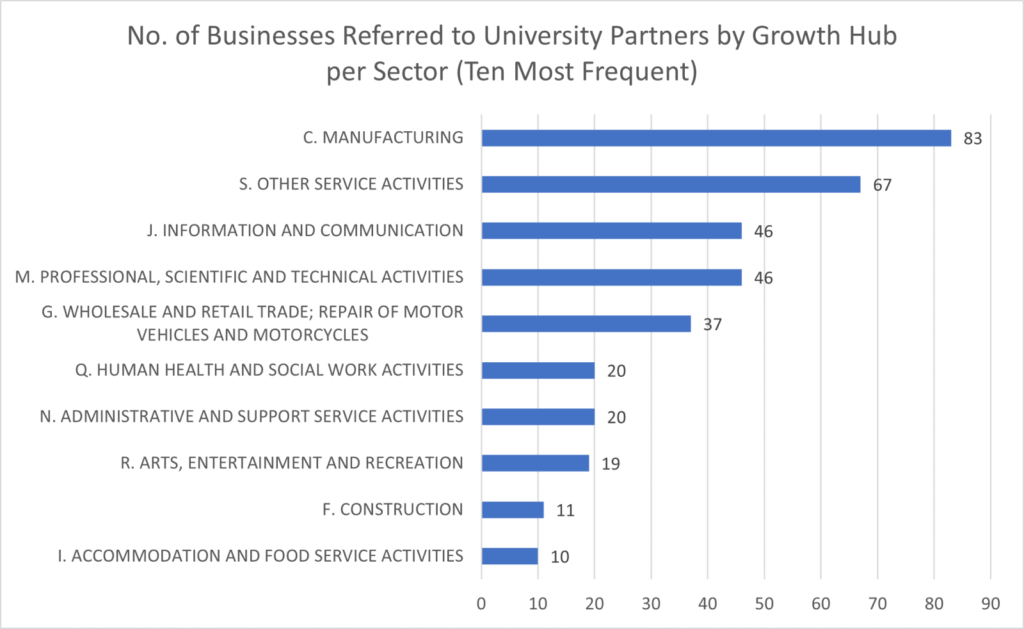
Size of Businesses
Over four-fifths (84.3%) of businesses receiving support from a university via the Growth Hub referral route are micro-businesses (less than 10 employees). Only 13.9% are described as small businesses (less than 50 employees) and 1.77% as medium-sized (less than 250 employees).
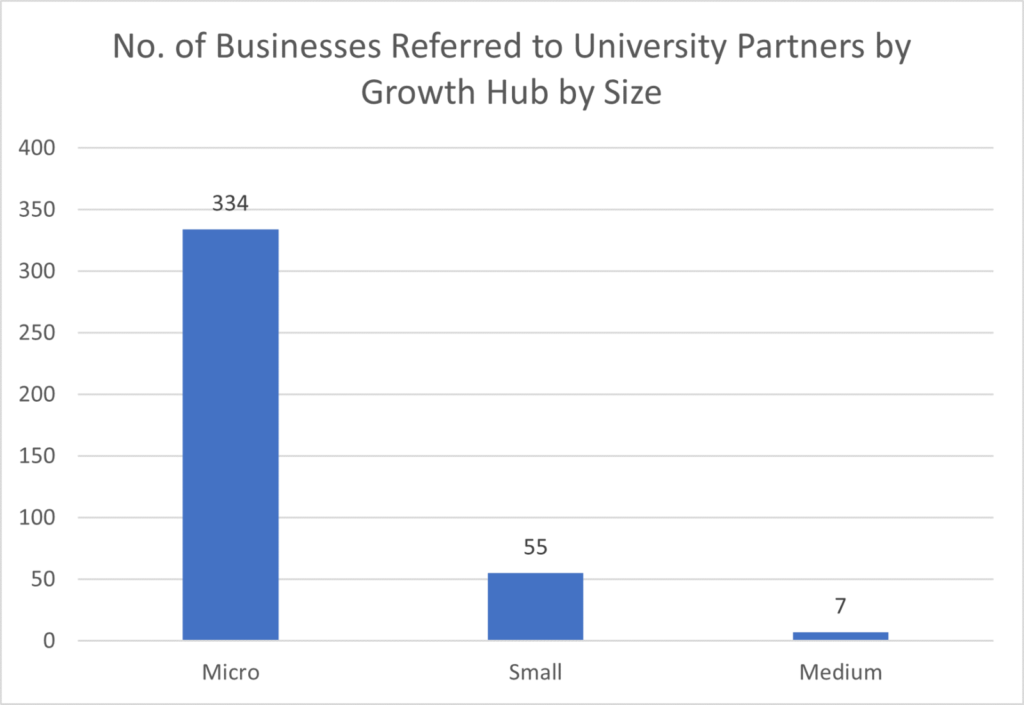
Kinds of Support
The support services offered by universities can be broadly categorised into four distinct but often overlapping areas:
- support in growing or running a business;
- use of facilities and equipment;
- courses for employees;
- recruitment of university students.
The support for growing and running a business can be either financial, technical or non-technical. Aston University allows businesses to access matched financial support through the Innovation Vouchers scheme and grants worth £2500 for ethnic or other minority-led SMEs to enter the supply chains of firms, with the Diverse Supply Chains programme.
Aston University also offer a variety of routes for businesses to receive non-technical support, including a Mentoring Programme in partnership with the GBSLEP; Consultancy Projects with their MBA students; and the Aston Programme for Small Business Growth. Coventry University provide non-technical support in conjunction with technical support with the Focus Digital Programme. They offer a package of workshops, one-to-one graphic design and assistance in developing new products or processes.
Thirteen of the 32 university schemes that received referrals from the Growth Hub are offering technical support. This encompasses largely STEM related research and development, short to long-term projects, with a goal of helping businesses to develop innovative and improved products and processes. This type of support often includes access to skills, technical equipment and technicians for prototyping and testing new products, an example of this is Aston University’s Enabling Technologies & Innovation Competences Challenge Project.
Many universities offer the use of specialist facilities and equipment to local businesses. For example, the University of Birmingham’s Medical Devices Testing and Evaluation Centre (MD-TEC) allows participating SMEs to access their usability suite, when undertaking a medical devices project with the Centre. On the other hand, Birmingham City University’s STEAMhouse initiative offers office and incubator space to businesses.
Universities in the region have been adept at both achieving objectives around increasing employability and graduate employment and retention in the region and meeting specific skills gaps by supporting businesses in recruiting their current and past students. An example of this is the Higher Level Skills Match (HLSM) programme, that runs in partnership with Birmingham City, Aston and Newman Universities. It matches businesses with high-calibre graduates, further facilitating knowledge exchange between universities and businesses. The provision of apprenticeships or professional development courses for new or existing staff is another service frequently offered to businesses, e.g. the Staffordshire University’s apprenticeship programme.
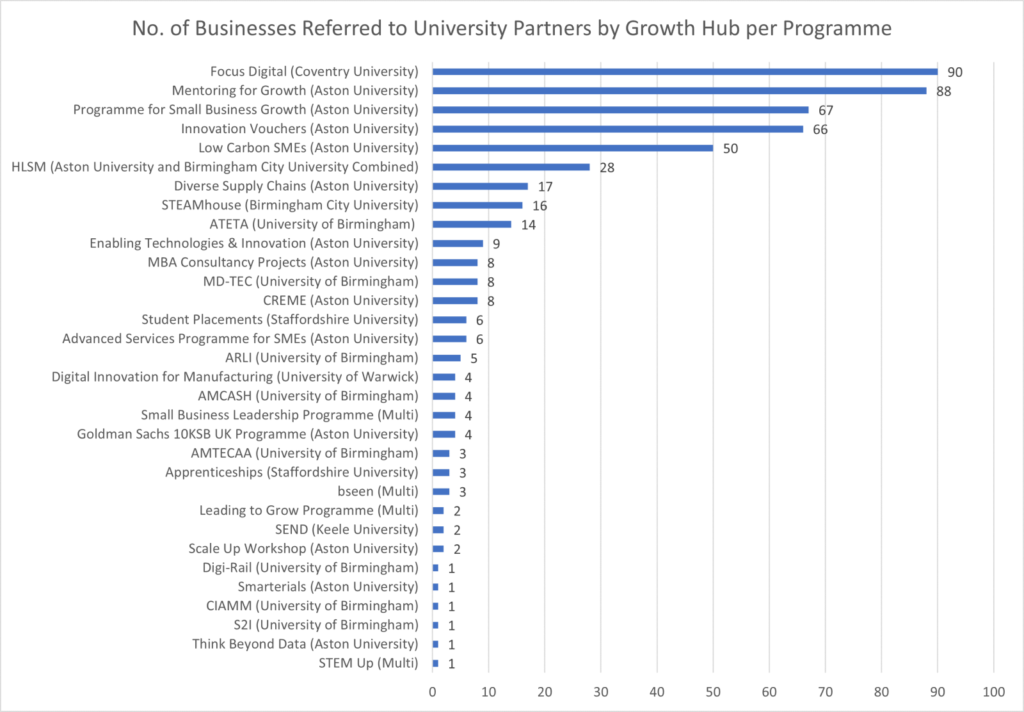
Some universities have developed specialised business support programmes in response to local needs and national priorities. Aston University’s Low Carbon SMEs programme and the University of Birmingham’s Accelerating Thermal Energy Technology Adoption (ATETA) scheme supported a combined 61 businesses to adopt low zero carbon energy technologies through Growth Hub referrals. The Centre for Research in Ethnic Minority Entrepreneurship (CREME) delivers expertise on business support for ethnic minority entrepreneurs. Eight businesses were referred to CREME by the Growth Hub.
This blog was written by Alice Pugh, Policy and Data Analyst, Juliane Schwarz, Research Fellow and intern Freya Williams, for City REDI / WMREDI, University of Birmingham.
Disclaimer:
The views expressed in this analysis post are those of the authors and not necessarily those of City-REDI, WMREDI or the University of Birmingham.
